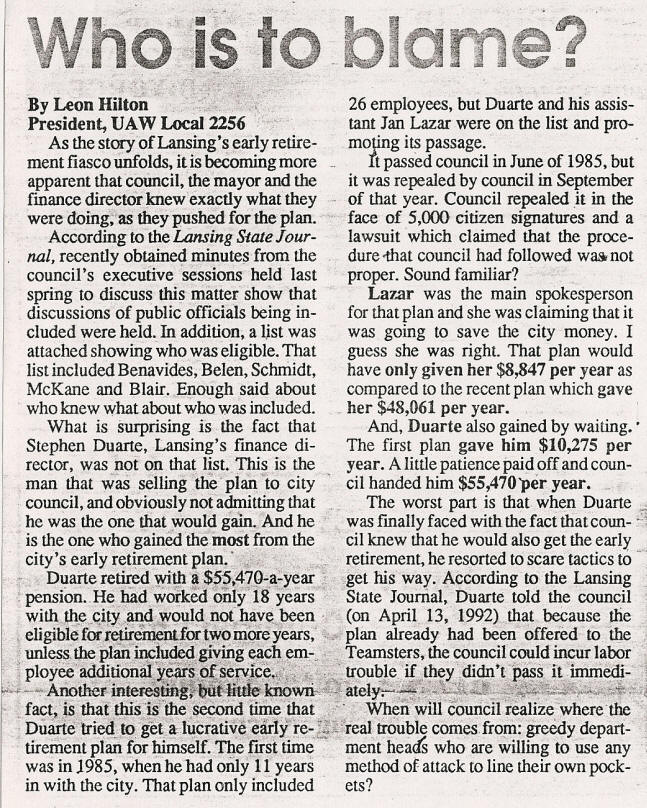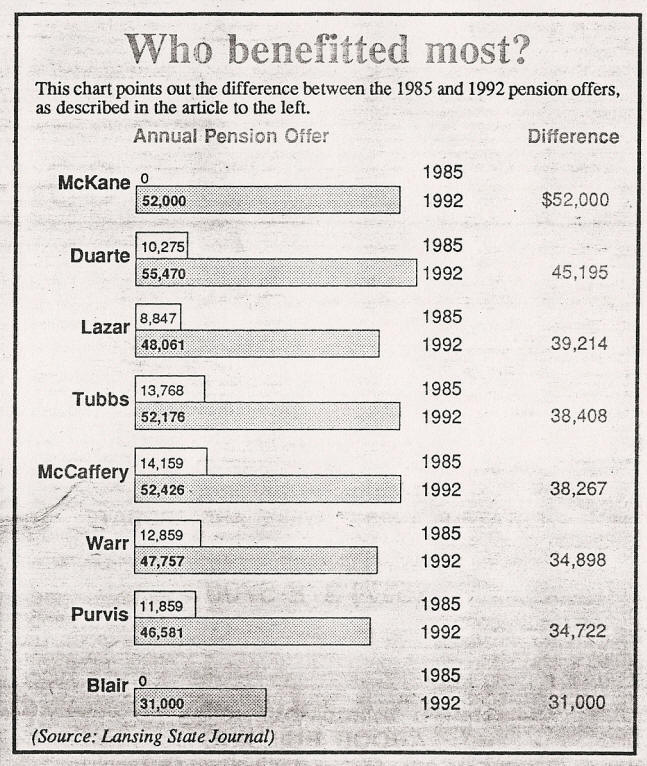In June 1985, Lansing city council passed a new retirement ordinance. In additional to a number of routine changes, it included a special early retirement provision for a small group of employees. There was no mention of this provision in the ordinance title or the preamble. The special provision applied to employees in the Executive Pay Plan hired before February 16, 1985 and included many department heads and their assistants and most of the council and internal audit staff. They would be allowed to retire with the minimum required service - 8 years - regardless of their age. Normally, employees could not retire until age 58. Along with a pension calculated by multiplying years of service times average compensation for the last 2 years times 2%, they would get health and dental insurance for themselves and their families, as well as life insurance - for the rest of their lives. The deal was offered because due to recent City Charter changes, Executive Pay Plan employees had become "at will" employees, losing the job security they enjoyed previously. But as was later revealed, even "at will" employees could be granted 6 months of severance pay and medical insurance. And some of the department heads already considered themselves "at will" employees. (Sept 8) Further, two of the employees specifically included in the plan - budget director Jan Lazar and Controller Steve Duarte - somehow had avoided being deemed "at will" employees. Lazar estimated that the plan would cost less than $20,000 a year. (July 7) Council member and mayoral candidate Lou Adado was to say later that the plan was developed by the Finance Department (headed by Steve Duarte and Jan Lazar), endorsed by the mayor and presented to the city council before the retirement board was allowed to see it. (Sept 8) In early July, some council members began to have misgivings about the special retirement provision. Adado noticed that some of the employees included were not "at will" employees. And it appeared that the plan would cost $47,000 a year rather than $20,000. (July 15) At the July 22 council meeting, a proposal to stop or delay the plan failed to get the needed six votes. Council members Lucille Belen, Louis Adado, Patrick Lindemann and Alfreda Schmidt voted for the proposal. Charles Creamer, James Blair and Sidney Worthington voted against. Tony Benevides was absent. Belen called the plan "unheard of". Adado called it "ridiculous". And representatives from employee groups expressed their concern. (July 23) By the end of July, an employee group headed by Program Coordinator Vivian Preston and Development official Brenda Ballard, represented by attorney Andrew Goldstein, filed suit to stop the plan. (July 25) Soon after, a group of city employees initiated a petition drive to put a referendum rescinding the plan on the November ballot. (Aug 6) By August 23, nearly 5000 signatures had been gathered. 4788 were needed. Vivian Preston said that the drive was a cooperative effort by city employees belonging to the Teamsters union and Lansing Independent Employees Union as well as employees exempt from union membership. (Aug 24) When the petitions were presented August 23, city attorney Stephen Sawyer said the city charter required them to be submitted by July 31, 30 days after the ordinance was enacted. He also said the state constitution says that public pensions and retirement systems, once promised, are a contractual obligation "that shall not be diminished or impaired." (Aug 24) Opponents of the plan disagreed, claiming the 30 days was from the day ordinance went into effect. On Monday, August 26, city council passed a resolution to put repeal of the retirement ordinance on the November ballot. City attorney Sawyer said he believed that the July 31 deadline applied to a council-initiated referendum as well. Attorney Goldstein disagreed with Sawyer's interpretation of both the City Charter and the state Constitution. He said the provision in the Constitution did not apply because no one had retired yet, so would not be harmed by the plan's repeal. Further, since Sawyer was one of the employees eligible for the early retirement, Goldstein urged city council to hire an outside attorney to advise them on the issue. On Thursday, August 29, city council agreed to hire law firm Dickinson Wright Moon VanDusen & Freeman. On August 30, Mayor McKane withdrew his support for the plan and said he wanted to do away with the requirement that Executive Pay Plan employees hired before February 15 sign a contract making them "at will" employees. The morning of Monday, September 16, the retirement board voted "to ask the council to repeal the ordinance, take the repeal ordinance off the ballot and establish a policy under which the board would review all retirement-related issues before they are acted on by the council." Later that day, attorneys from Dickinson Wright told city council that the early retirement plan was invalid. The attorneys agreed with city attorney Sawyer's opinion that the petition drive missed the deadline. But the plan was invalid because the ordinance was not properly passed. Several council actions interfered with the pension ordinance being passed properly, including:
The Council put repeal of the ordinance on the agenda for the following Monday. The following Monday was September 23, but the vote on the repeal did not occur as planned due to bumbling on the part of the city attorney's office. Chief assistant city attorney Al Knot, who had promised to have the new ordinance ready before the 6:30 meeting, was 20 minutes late with the document, and then it was found to be full of errors. Brenda Ballard was quoted as saying "I don't even turn out rough drafts that look like this." Finally, on September 30, city council passed a new retirement ordinance without the dubious early retirement provision and took the repeal of the old ordinance off the November 5 ballot. The council also passed a resolution pledging that for the next two years any similar early retirement plans would not be considered. The council kept its promise. It wasn't until seven years later that they passed the Mother of All Early Retirements. The 1992 council included three members who were there in 1985: Lucille Belen, Alfreda Schmidt and Tony Benevides. (How soon they forgot.) Jim Blair had in the meantime been elected city clerk. Terry McKane was still mayor. Both took advantage of the new plan and retired, along with Brenda Ballard, Steve Duarte, Jan Lazar and 139 other employees. Bumbling assistant city attorney Al Knot had been promoted to city attorney, from which office he defended the new plan. Duarte and Lazar were behind both the 1985 plan and the 1992 plan. In 1992, they succeeded. Here is a list of the employees who qualified for the 1985 early retirement. It is from a July 25, 1985 article in the Lansing State Journal. The 1992 Retiree column was added by me.
The following article and chart was in the Lansing Labor News for February 12, 1993. The chart compares the pensions certain employees got in 1992 with what they would have gotten in 1985:
|
|||||||||||||||||||||||||||||||||||||||||||||||||||||||||||||||||||||||||||||||||||||||||||||||||||||||||||||||||||||||||||||||||||||||||||||||||||||||||||||||||||||||||||

